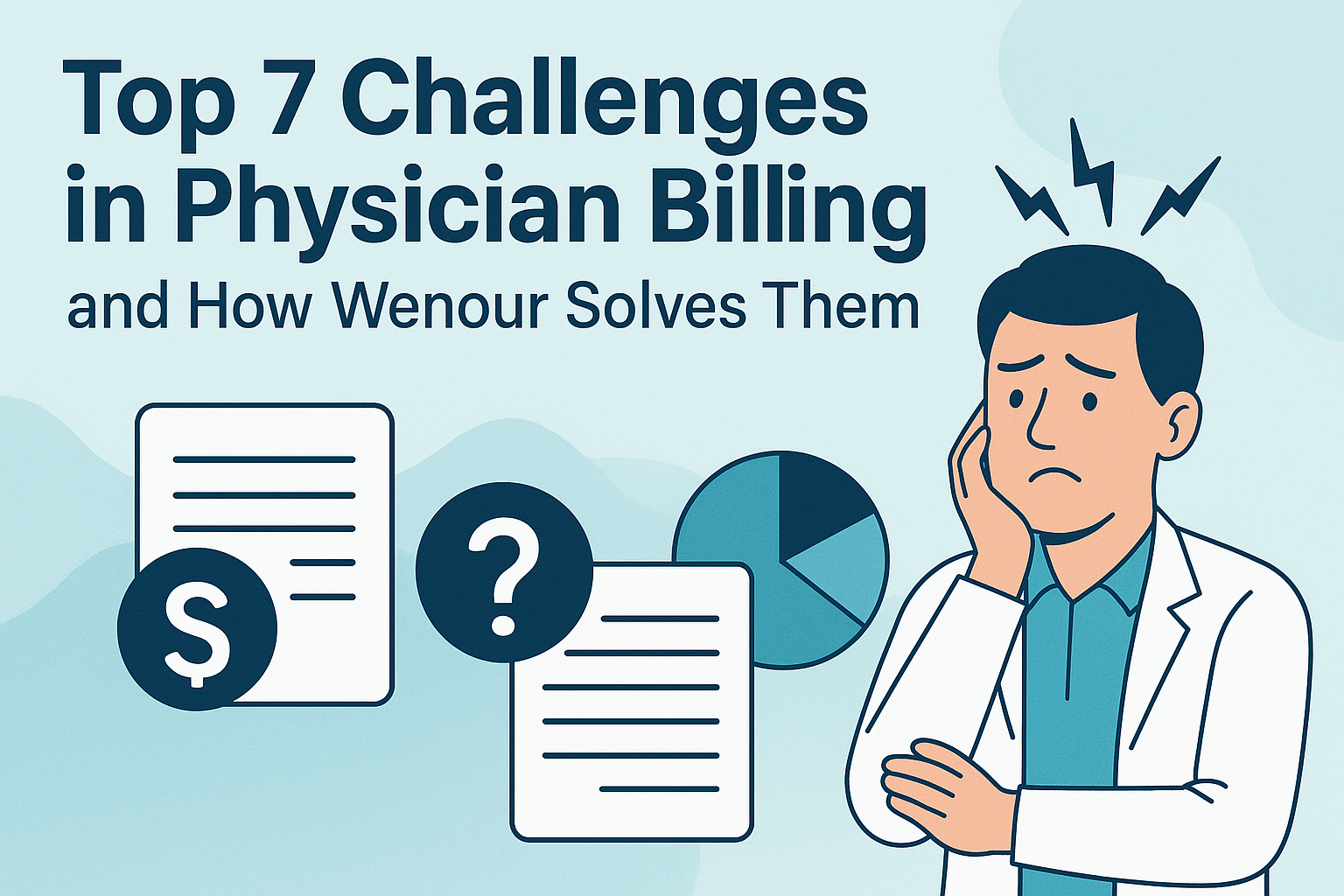
Top 7 Physician Billing Challenges & How Wenour Solves Them

Discover the 7 biggest hurdles in physician billing: denials, coding errors, slow payments, and more. Learn how Wenour’s automated solutions optimize your revenue cycle and boost practice profitability. Get expert insights and actionable strategies for success!
The 7 Biggest Challenges in Physician Billing
Seven most significant obstacles impacting physician billing efficiency and profitability, drawing on industry data and expert insights. We’ll explore the financial consequences of each challenge. Inefficient physician billing practices can significantly impact a medical practice’s financial health and even patient care. The Medical Group Management Association (MGMA) [1] regularly publishes data highlighting the substantial financial losses associated with billing inefficiencies. Accurate and timely billing is crucial for maintaining a healthy cash flow and ensuring the financial stability of the practice. The American Medical Association (AMA) [2] emphasizes the importance of accurate coding in minimizing denials, a critical factor in maintaining financial stability.
Challenge 1: High Claim Denial Rates & Effective Denial Management
Problem of claim denials, exploring common causes (coding errors, documentation issues, etc.) and providing practical strategies for prevention and appeal. We’ll emphasize the financial implications of denials. High claim denial rates represent a significant financial drain on medical practices. According to MGMA data [1], common denial reasons include incorrect coding, missing information, and inadequate documentation. Proactive denial management strategies, including implementing robust coding and documentation protocols, are crucial for minimizing denials. Best practices for denial management, as outlined by the Healthcare Financial Management Association (HFMA) [3], include establishing a clear appeals process, regularly reviewing denial reasons, and investing in staff training to improve coding accuracy and documentation completeness.
Challenge 2: Claim Processing Errors & How to Minimize Them
Errors in claim processing, examining common mistakes and offering practical solutions to prevent them. We’ll highlight the importance of accurate data entry and proper documentation. Claim processing errors, such as incorrect coding, missing information, and improper documentation, contribute significantly to revenue loss. The cost of these errors can be substantial, impacting a practice’s bottom line. The American Academy of Professional Coders (AAPC) [4] emphasizes the importance of accurate medical coding in minimizing claim processing errors. Implementing quality control measures, such as regular audits of submitted claims and staff training on proper coding and documentation techniques, can significantly reduce the frequency of errors.
Challenge 3: Slow Payments from Insurance & Strategies for Faster Reimbursement
The issue of slow payments from insurance companies, exploring reasons for delays and providing actionable strategies to accelerate reimbursement. We’ll discuss negotiation tactics and effective follow-up procedures. Slow payments from insurance companies create significant cash flow challenges for medical practices. MGMA and HFMA reports [1, 3] often cite data on average payment times for different insurance companies, highlighting the variability and potential delays. Strategies to improve payment times include negotiating better payment terms with insurance providers, improving claim submission processes to minimize errors and delays, and implementing effective follow-up procedures to promptly address outstanding claims. Effective communication with insurance companies is crucial in resolving payment delays.
Challenge 4: Inefficient Workflow & Streamlining Your Revenue Cycle
Focuses on improving workflow efficiency, examining common bottlenecks and providing practical solutions to streamline the revenue cycle. We’ll discuss process optimization and staff training. Inefficient workflows can significantly hinder a practice’s revenue cycle management. Identifying and addressing bottlenecks in the billing process is crucial for optimization. A case study [5] of a practice that successfully streamlined its revenue cycle demonstrated a significant increase in efficiency and revenue. Best practices for workflow optimization, as advised by RCM consultants [6], include implementing automated billing systems, improving claim submission processes, and investing in staff training to enhance efficiency and accuracy.
Challenge 5: Lack of Technology & Leveraging Automated Billing Solutions
The role of technology in improving physician billing, highlighting the benefits of automated billing solutions, such as reduced errors, increased efficiency, and improved cash flow. We’ll discuss software options and their features. The adoption of automated billing solutions can significantly improve efficiency and accuracy in physician billing. Industry reports [7] often cite data on the return on investment (ROI) of automated billing systems, demonstrating their cost-effectiveness. Automated solutions reduce manual errors, streamline workflows, and improve cash flow. Choosing the right medical billing software is crucial, and careful consideration of features, integration capabilities, and cost is essential.
Challenge 6: Regulatory Compliance & Staying Up-to-Date with Changes
The importance of staying current with evolving billing regulations and compliance requirements. We’ll provide resources and strategies for ensuring compliance. Staying compliant with evolving billing regulations, such as HIPAA [8], is crucial for avoiding penalties and maintaining a strong reputation. The Centers for Medicare & Medicaid Services (CMS) [9] website provides detailed information on current billing guidelines and regulations. Regular review of these guidelines and implementation of appropriate compliance measures are essential for maintaining compliance. CMS Physician Fee Schedule provides a comprehensive resource for understanding billing codes and reimbursement rates.
Challenge 7: Staff Training & Building Internal Expertise
The importance of well-trained staff in ensuring efficient and accurate billing. We’ll discuss training programs and resources for improving staff knowledge and skills. Investing in staff training is essential for ensuring accurate and efficient billing practices. Resources from the AAPC [4] and MGMA [1] provide valuable training programs and materials for medical billing professionals. Effective staff training includes regular updates on coding guidelines, compliance requirements, and best practices for claim submission and denial management. Continuous professional development is crucial for maintaining expertise and ensuring the practice’s billing processes remain efficient and compliant.
How Wenour Solves These Challenges
How Wenour’s solutions directly address the previously discussed challenges, emphasizing the benefits of automation, improved accuracy, and enhanced efficiency. We’ll showcase Wenour’s unique value proposition. Wenour offers a comprehensive suite of automated billing solutions designed to address the key challenges faced by physicians in billing and coding. Our solutions streamline workflows, reduce errors, improve accuracy, and accelerate reimbursement. Wenour’s features include automated claim submission, denial management tools, and real-time reporting, all designed to optimize your revenue cycle and maximize practice profitability. Customer testimonials and case studies demonstrate Wenour’s effectiveness in helping medical practices improve their billing processes and achieve significant financial gains.
Contact Wenour today for a free consultation and discover how we can help you optimize your revenue cycle and maximize your practice’s profitability!
References
- Medical Group Management Association (MGMA). (2025). Various Reports and Data on Medical Billing and Revenue Cycle Management. Retrieved from https://www.mgma.com/
- American Medical Association (AMA). (2025). Coding, Billing, and Insurance. Retrieved from https://www.ama-assn.org/practice-management/coding-billing-insurance
- Healthcare Financial Management Association (HFMA). (2025). Various Resources and Education on Healthcare Finance. Retrieved from https://www.hfma.org/
- American Academy of Professional Coders (AAPC). (2025). Education and Certification for Medical Coders. Retrieved from https://www.aapc.com/
- [Case Study Source – Information Needed] (N.D.). *[Title of Case Study]*. [Source Name]. Retrieved from [URL]
- [RCM Consultant Quote Source – Information Needed] (N.D.). *[Title of Article or Report]*. [Source Name]. Retrieved from [URL], quoting [Name of RCM Consultant].
- [Industry Report Source – Information Needed] (N.D.). *[Title of Report]*. [Source Name]. Retrieved from [URL]
- U.S. Department of Health and Human Services. (1996). Health Insurance Portability and Accountability Act of 1996 (HIPAA). Retrieved from https://www.hhs.gov/hipaa/
- Centers for Medicare & Medicaid Services (CMS). (2025). Medicare and Medicaid Programs. Retrieved from https://www.cms.gov/
This article provides general information and should not be considered medical, legal, or financial advice. Consult with relevant professionals for specific guidance.























